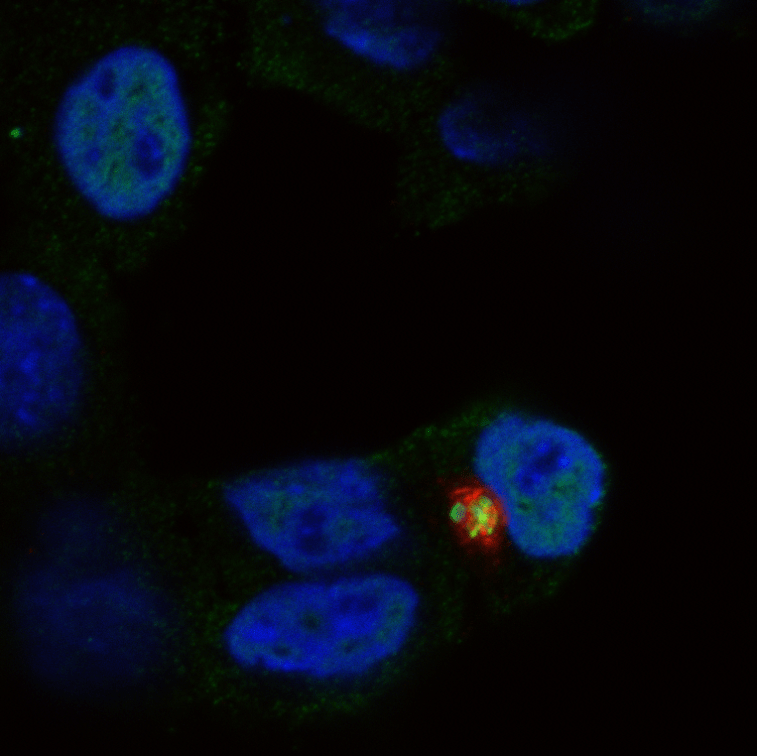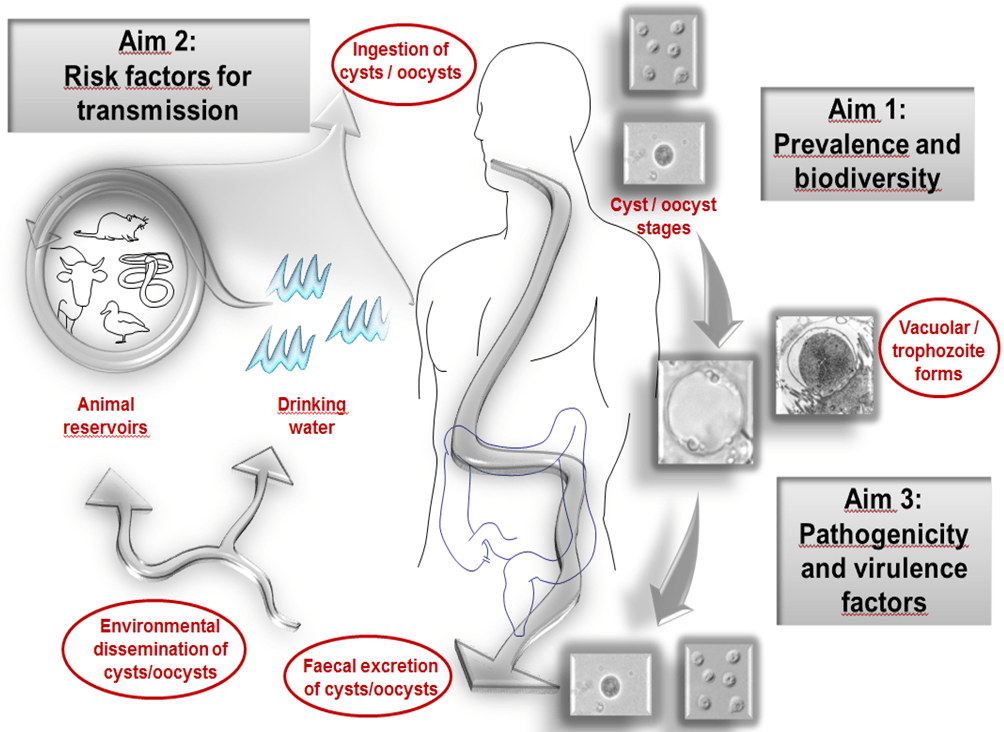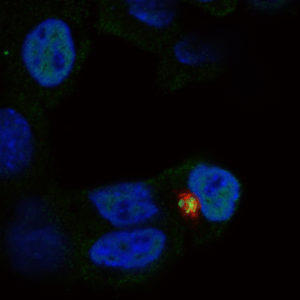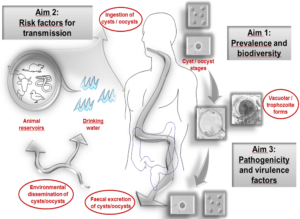Ecology and pathophysiology of intestinal Protozoa
INSERM U1019 – CNRS UMR9017 – Lille University – CHU Lille

Presentation
The team Ecology and Physiopathology of Intestinal Protozoa (ECOPHIP) headed by Dr Eric VISCOGLIOSI (Research Director at CNRS) focuses its research activities on the intestinal parasitic protozoa Blastocystis and Cryptosporidium, which represent major socioeconomic and public health problems. Both parasites are responsible for gastrointestinal infections which, in the case of Cryptosporidium, can be serious or even fatal in children and immunocompromised patients. However, these protozoa are still poorly studied and generally neglected by health authorities, even though few or no treatments are effective against them. ECOPHIP’s current and future work, which has the particularity of combining “field studies” and “laboratory research”, aims to clarify the molecular epidemiology of these parasites and their circulation in human and animal populations as well as in the environment (research of transmission risk factors) while identifying the mechanisms leading to the pathogenesis of these parasites. The goal of ECOPHIP is to propose strategies to implement prevention and control measures to reduce the incidence of these parasites.
Highlights
- ECOPHIP has an international recognition in the field of parasitology and health ecology as evidenced by its scientific production, particularly concerning the intestinal parasites Blastocystis and Cryptosporidium. In recent years, this team has thus contributed to a better understanding of the molecular epidemiology, transmission and pathogenesis of these microorganisms. For example, the numerous large-scale surveys carried out in Africa and the Middle East as well as in Europe have highlighted the wide circulation of Blastocystis in the human population and identified the main animal reservoirs of zoonotic transmission. Its pathogenicity and invasive potential have been confirmed through clinical case studies. The development of proteomic and genomic approaches have outlined the mechanisms involved in its virulence.
- Otherwise, ECOPHIP has also demonstrated the positive impact of Blastocystis on the host intestinal microbiota and the study of the role of this parasite on human and animal health is currently supported by the Region Hauts-de-France (STIMulE exploratory project funding) and by SATT Nord (co-maturation program).
- ECOPHIP was also the first to demonstrate the involvement of Cryptosporidium in the development of digestive cancers in experimental in vivo and ex vivo models, which has been confirmed in humans through several epidemiological studies. The infection of human colonic explants by the parasite is therefore in progress with the financial support of the Catholic University of Lille. All these results have motivated us to focus our research on the identification of the molecular signature of the digestive cancer induced by this parasite. In particular, we are exploring the role of Cryptosporidium in cancer epigenetics (Funding: Plan Cancer Inserm) and the signaling pathways potentially involved in this inducing process (Funding: Bonus H CHU of Lille) through different approaches including transcriptomics and comparative genomics.
- In parallel, we are testing different inhibitors that can target Cryptosporidium (Funding: CIIL inter-team program). ECOPHIP also actively interacts with its social and economic environment through its expertise activities and has a strong attractiveness as attested by its national and international collaborations and the training of numerous foreign students from different academic levels.
Members
Eric VISCOGLIOSI
Research Director at CNRS, Team leader
Magali CHABE
Assistant Professor, University Lille
Gabriela CERTAD
Assistant Professor, Catholic University of Lille
Sadia BENAMROUZ-VANNESTE
Assistant Professor, Catholic University of Lille
Pierre GOSSET
Hospital Practitioner, Catholic University of Lille
Adriana MIHALACHE
Hospital Practitioner, Catholic University of Lille
Nausicaa GANTOIS
Engineer, Institut Pasteur of Lille
Jérémy DESRAMAUT
Research technician, Institut Pasteur of Lille
Manasi SAWANT
PhD student
Salma KHALED
PhD student
Timothé GUILAVOGUI
PhD student
Muriel KHALIL
Master 2 student
Publications
Audebert C, Bonardi F, Caboche S, Guyot K, Touzet H, Merlin S, Gantois N, Creusy C, Meloni D, Mouray A, Viscogliosi E, Certad G, Benamrouz-Vanneste S, Chabé M (2020).
Genetic basis for virulence differences of various Cryptosporidium parvum carcinogenic isolates.
Sci Rep 10: 7316
Certad G, Follet J, Gantois N, Hammouma-Ghelboun O, Guyot K, Benamrouz-Vanneste S, Fréalle E, Seesao Y, Delaire B, Creusy C, Even G, Verrez-Bagnis V, Ryan U, Gay M, Aliouat-Denis CM, Viscogliosi E (2019).
Prevalence, molecular identification, and risk factors for Cryptosporidium infection in edible marine fish: a survey across sea areas surrounding France.
Front Microbiol 10: 1037
Certad G, Viscogliosi E, Chabé M, Caccio S (2017).
Pathogenic patterns of Cryptosporidium and Giardia.
Trends Parasitol 33: 561-576
Baydoun M, Benamrouz-Vanneste S, Creusy C, Guyot K, Gantois N, Chabé M, Delaire B, Mouray A, Baydoun A, Forzy G, Chieux V, Gosset P, Senez V, Viscogliosi E, Follet J, Certad G (2017).
Three-dimensional (3D) culture of adult murine colon as an in vitro model of cryptosporidiosis: proof of concept.
Sci Rep 7: 17288
Audebert C, Even G, Cian A, The Blastocystis Investigation Group, Loywick A, Merlin S, Viscogliosi E, Chabé M (2016).
Colonization with the enteric protozoa Blastocystis is associated with increased diversity of human gut bacterial microbiota.
Sci Rep 6 : 25255
Fréalle E, El Safadi D, Cian A, Aubry E, Certad G, Osman M, Wacrenier A, Dutoit E, Creusy C, Dubos F, Viscogliosi E (2015).
Acute Blastocystis-associated appendicular peritonitis in a child, Casablanca, Morocco.
Emerg Infect Dis 21: 91-94
Keywords
Intestinal protozoa ; Blastocystis ; Cryptosporidium ; Molecular epidemiology ; Transmission ; Pathogenicity ; Digestive disorders ; Intestinal microbiota ; Cancer ; OMICs ; Epigenetics ; Drugs ; In vitro, in vivo and ex vivo models
Team contact
Dr Eric Viscogliosi
Research Director at CNRS, Team leader
eric.viscogliosi@pasteur-lille.fr
03 20 87 79 61




